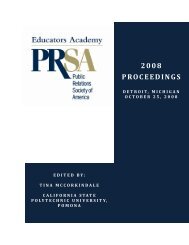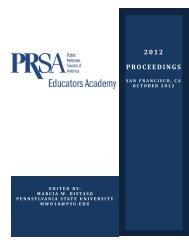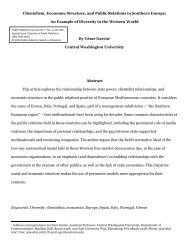2010 - Public Relations Society of America
2010 - Public Relations Society of America
2010 - Public Relations Society of America
You also want an ePaper? Increase the reach of your titles
YUMPU automatically turns print PDFs into web optimized ePapers that Google loves.
the past decade. Despite the preponderance <strong>of</strong> companies conducting business ethically and<br />
responsibly, these episodes contribute to growing public distrust. On the other hand, the current<br />
economic conditions create a conundrum: businesses struggling to survive may not see<br />
themselves as capable, in these circumstances, to contribute financially or even in kind to the<br />
community welfare, though many in those communities stand in greater need than ever.<br />
The current economic situation notwithstanding, the challenge remains <strong>of</strong> defining the<br />
proper relationship between an organization, particularly a pr<strong>of</strong>it-making organization, and the<br />
society within which it operates. To varying degrees depending on the role <strong>of</strong> the free market,<br />
businesses play an essential role in societal functions: creating jobs; generating revenue; etc.; and<br />
those businesses depend upon society, largely through government structures, for services and<br />
infrastructure such as a skilled and educated workforce, transportation conduits, utilities, and so<br />
forth. Yet the struggle to strike and maintain the right balance, including between self-regulation<br />
and imposed regulation, is an ongoing one.<br />
Questions pertaining to CSR are daunting and expanding. No single study or even a<br />
stream <strong>of</strong> studies can hope to exhaust or settle the issues. This paper describes the result <strong>of</strong> a<br />
focused project aimed at revealing, within one geographic sector, the extent to which CSR<br />
matters in a measurable way, and suggests this rational measure is a reasonable gauge <strong>of</strong> moral<br />
impact.<br />
Literature Review<br />
We could begin this section with a lengthy discussion <strong>of</strong> how CSR should be defined, but<br />
the space would be better used to frame this project more narrowly. This author agrees with<br />
Werther and Chandler’s (2006) observation: “Businesses operate against an ever changing<br />
background <strong>of</strong> what is considered socially responsible. CSR is not a stagnant concept. It<br />
continues to evolve as cultural expectations change, both here (in the U.S.) and abroad” (p.12).<br />
Consequently, it is wise to describe CSR in more general, elastic terms than to define it<br />
succinctly so as to prevent the concept from responding to changing circumstances, expectations<br />
and opportunities. For the purpose <strong>of</strong> this study, it will do to acknowledge, as does Joseph<br />
(2001), that CSR embraces areas such as treatment <strong>of</strong> the workforce, impact on the marketplace,<br />
impact on the environment, support for the community and commitment to human rights. Smith<br />
(2003) <strong>of</strong>fers an equally broad approach, maintaining, “CSR refers to the obligations <strong>of</strong> the firm<br />
to society or, more specifically, the firm’s stakeholders – those affected by corporate policies and<br />
practices” (p.53). He uses the term “paternalistic capitalism” to convey the sentiment.<br />
As CSR issues continue to generate academic and pr<strong>of</strong>essional discussion, most<br />
representatives <strong>of</strong> both those sectors are familiar with the central arguments <strong>of</strong> whether CSR is<br />
an appropriate concern <strong>of</strong> business and, if it is, whether the motivation for it is to be found in<br />
pr<strong>of</strong>its or moral imperative. Berkhout (2005) summarizes the face-<strong>of</strong>f well, citing Milton<br />
Friedman’s familiar claim that the only responsibility <strong>of</strong> business is to make pr<strong>of</strong>its while acting<br />
within regulatory constraints. Berkhout says the contrasting position is that CSR actually<br />
reinforces rather than undermines pr<strong>of</strong>it-making potential. Still, he concludes that, “Both sides<br />
agree that a company should only adopt practices that are deemed pr<strong>of</strong>itable” (p.16).<br />
Significantly though, Smith (2003) notes that the call for socially responsible behavior by<br />
business is becoming more urgent, driven, he says, by globalization and the expanding power<br />
businesses exert. He points out that demands for responsibility are coming from “mainstream<br />
quarters <strong>of</strong> society” (p.55) as well as activists. Handy (2002), even well before the recent<br />
economic downturn, passionately but reasonably noted and lamented the prevailing business<br />
measure <strong>of</strong> merit – shareholder value as gauged by share price. He acknowledged that corporate<br />
56
















